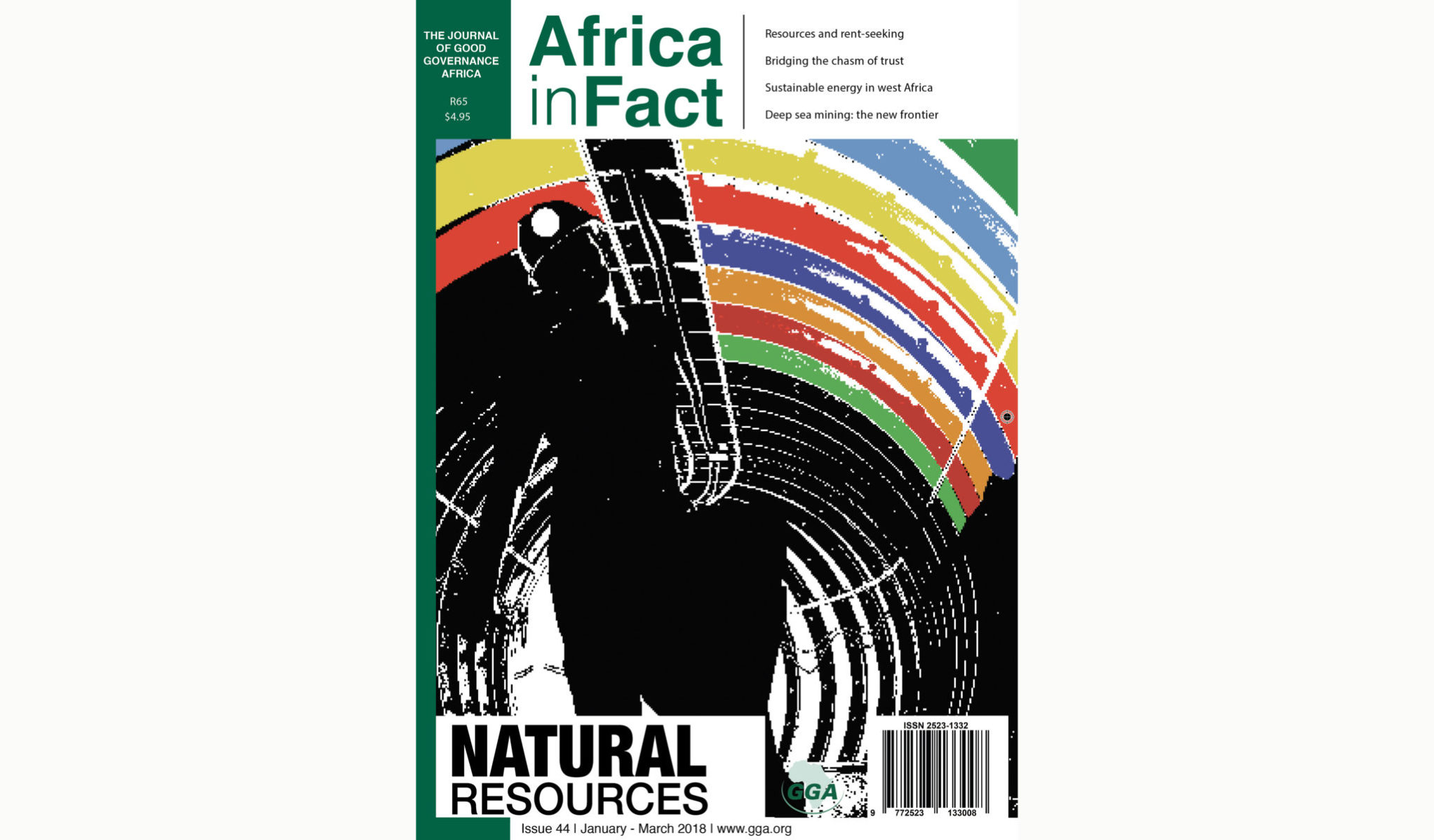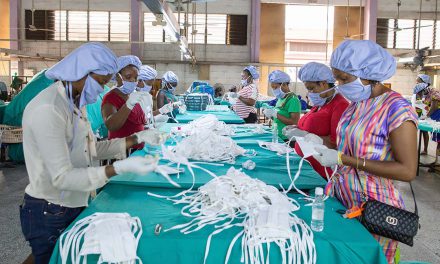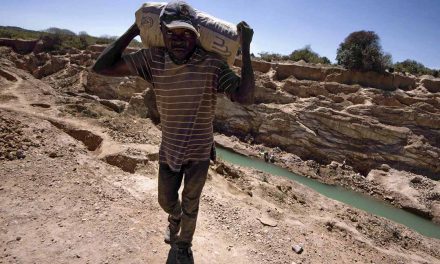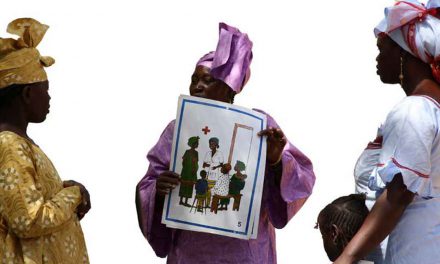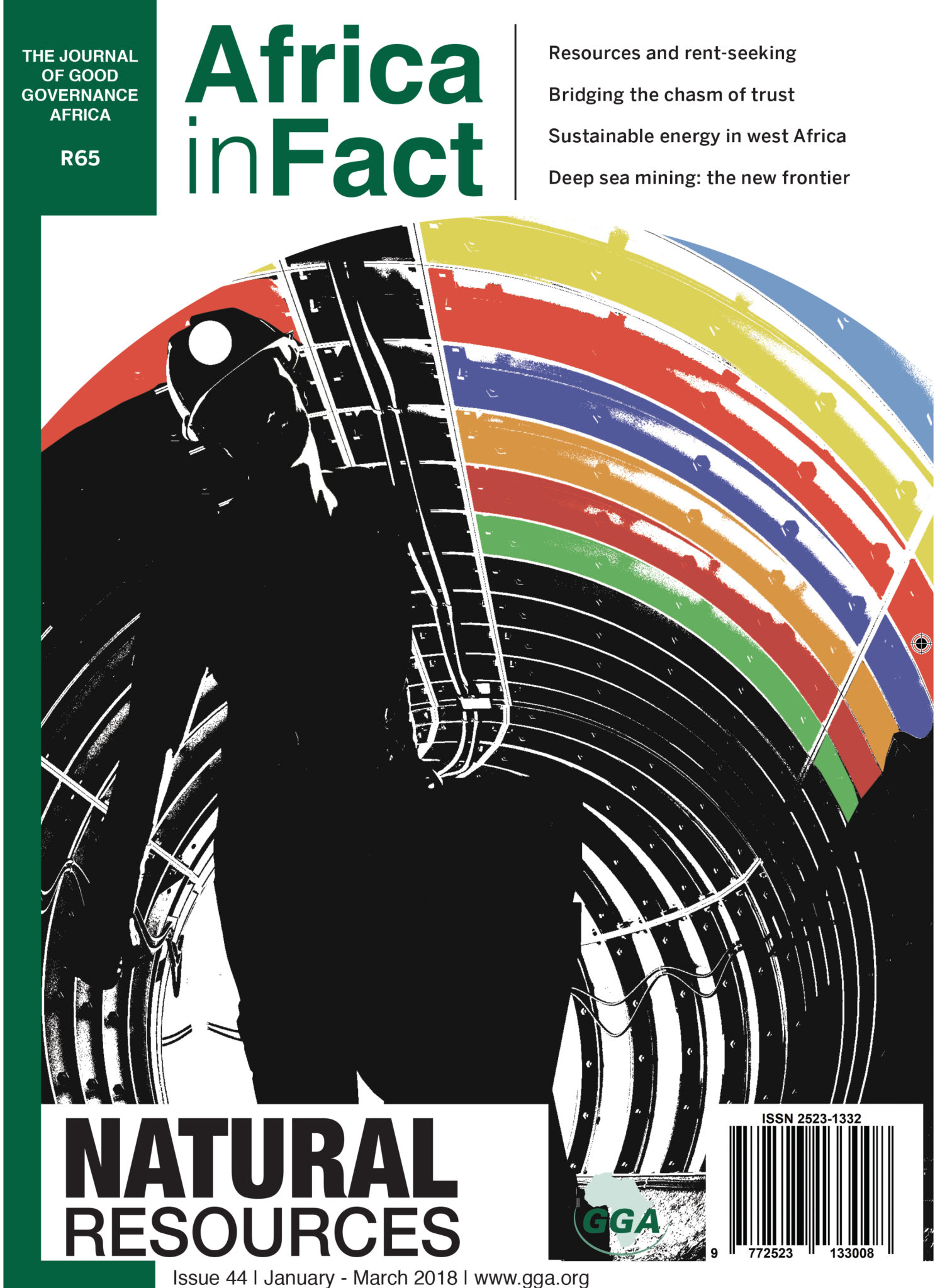
Welcome to the first edition of Africa in Fact for 2018 – and the first to appear on shelves at selected bookstores. The topic is natural resources, which is also one of our core programmes at Good Governance Africa. We adopt a broad definition of resources, but our focus has been primarily on extractives and the pursuit of the “green” and “blue” economies, as well as the related issues of land, power and energy.
This issue of Africa in Fact explores the complexity of resource-related issues around Africa and seeks to path-find constructive and innovative avenues ahead. Gavin Hilson’s lead article offers a surprisingly practical answer to the question why many African countries favour large-scale extractive projects. Picking up on the Africa Progress Panel, Charles Akong of UNECA asks why African people are not better off, given the continent’s resource wealth. His answer, too, has practical implications which lawmakers would be advised to take on board. Looking at the need to move away from current energy sources to sustainable alternatives in west Africa, our own Ola Bello, Executive Director of GGA Nigeria, offers some effective policy solutions.
Yunus Momoniat paints a sombre view of the political looting that is endemic to the continent, but suggests that this may be coming to an end. (Angola is a case in point, with Isabel Dos Santos’s dismissal as head of Sonangol a welcome sign of change.) Meanwhile, Daniel Bekele questions the will to implement much-needed policy reforms.
As Ross Harvey observes, the extractives environment is currently marked by a serious “trust deficit” between the two major players – governments and corporates. A little goodwill, and a better understanding of their own interests, would enable all stakeholders to transform the sector.
Richard Morgan of Anglo American shares this view, seeing trust in the system as a long-term process. Antagonists could change things for the better by engaging in effective dialogue as strategic partners, he suggests. In support of both their views, Tracey Cooper shares some useful concepts for the development of better collaboration between major stakeholders.
African policymakers face other challenges, some of them external. As Andrew Bergel shows, the complex issue of mechanisation will affect our continent too – perhaps more than it has developed countries – and timely planning and policies could turn this to our advantage. Nick Branson’s comparison between Nigeria and Tanzania provides some insights into the ways in which African countries can build local-content requirements into resource deals, so benefitting both tax collection and their citizens. In this connection, GGA researcher Neil Zitha examines three different ownership models that prevail within the extractive sector, and shows how governance and key stakeholder cooperation can yield major dividends for citizens.
All of these articles add up to a clarion call for better, evidence-based policy development with regard to natural resources around the continent, as Professor Hilson shows, for instance, more is to be gained from state support of small-scale indigenous mining than from fruitless attempts to prevent it. The common threads throughout are the key concepts of sustainability and appropriate intentionality – which consciously aims to leave a positive legacy for future generations.
This issue of Africa in Fact also busts some myths. Gavin Keeton has some very critical remarks to make about UNCTAD’s recent report on trade misinvoicing. In a harshly real piece, Lucas Ledwaba busts the stereotypical negative image of the zama-zamas, or illegal miners, in South Africa. And the cliché of potential “water wars” in Africa is thoroughly dismantled by Anthony Turton.
Africa’s varied wildlife is, of course, another of our abundant natural resources. As an example, Terence Corrigan and Marius Roodt propose a compromise that might help to save the continent’s rhinos. Our oceans, too, offer abundant possibilities, as Rosanna Carver shows in her examination of the possible role of the “blue economy”.
Increasing recognition of the ocean economy’s value is accompanied by increasing contestation for its benefits, and she offers very relevant suggestions for managing this to create more benefit for more people. In his piece on the “new frontier” of deep-sea mining, François Misser makes some timely remarks concerning ocean governance, which will be essential in combatting (further) environmental degredation and depredation.
Finally, in terms of water security, Sechaba Mokhethi brings to our attention an irony that is not unfamiliar around Africa: despite being a regional water supplier, Lesotho does not currently supply potable water to many of its citizens.
Africa in Fact also aims to bring to the fore the lives of Africans as they go about their business around the continent. With this in mind, Kolawole Talabi and Arthur Debruyne expose illegal fishing by European boats off Sierra Leone’s coastline and its effects on the local fishing community. And Mike Loewe shares the remarkable story of the Xolobeni community’s determination to protect its way of life.
As I noted earlier, Africa’s natural resources are a major theme of GGA. This time last year we hosted a multi-lateral meeting involving UNDP, UNECA, the African Union, several Chambers of Mines, several oil and gas majors, mining houses and other NGOs at a meeting on the theme of the ethics of natural-resource extraction.
A year down the line this edition of Africa in Fact helps us to see, with even more precision, the need for corporations to integrate social plans into their mainstream business. A similar observation can be made regarding the “business” of government. As part of the Mining Indaba sustainability advisory committee, we are encouraged to see that greater efforts are being made to mainstream sustainability and governance concerns, and we look forward to next month’s edition in Cape Town!
Having just launched our first book in this natural resources programme on the pressing theme of Land Rights in South Africa, we will continue to work towards building goodwill and alignment between governments, the private sector and civil society. After all, it is clear that it is only by working together that we can hope to arrive at better and – ultimately – good governance on our continent. Wishing you, our partners, members, associates and readers, a peaceful and a prosperous 2018.
ALAIN TSCHUDIN is a former Executive Director of Good Governance Africa. He is a registered psychologist with Ph.D.s in Psychology and in Ethics. He was a Swiss Academy Post-doctoral Fellow at Cambridge and oversaw the Conflict Transformation & Peace Studies Programme at UKZN for several years. He has broad research and community engagement interests and has worked for various universities in Africa and Europe, with the European Commission, with local and international NGOs, as CEO of a leadership development agency, and as lead consultant for Save the Children and UNICEF, most recently as Child Protection Assessment Coordinator for Northern Syria. Alain has an adjunct association with the International Centre of Non-violence (ICON) and the Peacebuilding Programme at the Durban University of Technology.

